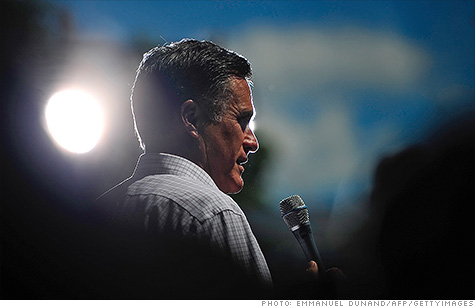Search News

Mitt Romney has not released key details of his tax plan.
NEW YORK (CNNMoney) -- It has become clear that Mitt Romney does not want to release any additional tax returns.
But that's not the only tax issue the presumptive nominee has been reluctant to talk about. He has been equally quiet on a policy question that could have a direct impact on the amount of taxes paid by millions of Americans.
Romney has for months touted an ambitious plan that promises massive tax cuts. He has also steadfastly refused to say how he would pay for them.
Romney has proposed a 20% across-the-board cut to income tax rates. He also wants to scrap the Alternative Minimum Tax, eliminate the estate tax and chop the tax rate paid by corporations from 35% to 25%.
All those cuts mean the government would collect far less revenue. Romney claims his plan will make up the difference in-part by limiting deductions, exemptions and credits currently available to top-level income earners.
But he hasn't lifted the curtain on which deductions he is planning to curtail.
In April, reporters stationed outside a private fundraising event in Palm Beach, Fla. overheard the former Massachusetts governor rattle off a list of deductions that would likely be eliminated.
But a campaign official later said that the candidate was "tossing ideas out" and not "unveiling policy."
And just last month, when Romney was directly asked by CBS News to name the deductions, the candidate evaded the question, instead saying that "we'll go through that process with Congress."
The lack of detail extends even to tax breaks that Romney himself has taken advantage of -- to the tune of millions of dollars.
Romney and his campaign have, for example, given a variety of answers on what the candidate plans to do about the tax treatment of carried interest, an obscure compensation method used primarily in high-stakes finance.
The tax break, which benefits private equity partners, continues to save the Republican presidential candidate millions of dollars in taxes after a pioneering career at Bain Capital.
Romney has, in the past, explicitly called for keeping the tax benefit in place. But this election cycle, even when asked directly, the candidate has not clearly articulated a position.
Campaign staffers have added to confusion over the candidate's position, occasionally suggesting that Romney would, once elected, consider rolling back the tax break. At other times, the campaign has walked those suggestions back.
When asked again for more details about his tax plan, a spokesperson for the Romney campaign said to CNNMoney that Romney "has proposed a comprehensive plan to repair the nation's tax code by bringing marginal rates down to stimulate entrepreneurship, job creation, and investment, while still raising the revenue needed to fund a smaller, smarter, simpler government."
The spokesperson added that Romney "looks forward to working with Congress" on tax reform. In other words, don't expect more details unless he actually wins the race for president.
(Related: Romney's confounding position on carried interest)
From a political perspective, the lack of detail may be beneficial. After all, each deduction benefits a certain constituency. But the hazy policy prescription leaves the public in the dark -- and lets Romney skate on a devilishly difficult area of tax policy.
A recent report by the Tax Policy Center, an independent research group, showed just how difficult Romney's plan would be to implement, particularly if they are on top of other proposed tax cuts.
The Tax Policy Center estimates that if today's Bush-era income tax rates were made permanent, Romney's additional rate cuts would lead to a reduction of $320 billion in tax revenue in 2015.
One way to make up for that difference, the report said, would be to shave 72% off the value of all itemized deductions; above-the-line deductions (such as the one for alimony); a host of smaller tax credits; and benefits such as the health insurance tax break many workers get.
Lawmakers could decide to eliminate some benefits altogether and leave others untouched, or reduce them all but by different amounts. The analysis assumed no changes in taxpayer behavior.
"It won't be impossible to pay for substantial individual tax rate reductions by cutting tax expenditures," Howard Gleckman, the editor of TaxVox, wrote in a blog post. "But it will be very, very hard."
| Overnight Avg Rate | Latest | Change | Last Week |
|---|---|---|---|
| 30 yr fixed | 3.80% | 3.88% | |
| 15 yr fixed | 3.20% | 3.23% | |
| 5/1 ARM | 3.84% | 3.88% | |
| 30 yr refi | 3.82% | 3.93% | |
| 15 yr refi | 3.20% | 3.23% |
Today's featured rates:
| Latest Report | Next Update |
|---|---|
| Home prices | Aug 28 |
| Consumer confidence | Aug 28 |
| GDP | Aug 29 |
| Manufacturing (ISM) | Sept 4 |
| Jobs | Sept 7 |
| Inflation (CPI) | Sept 14 |
| Retail sales | Sept 14 |